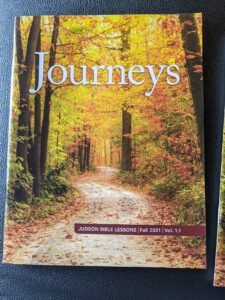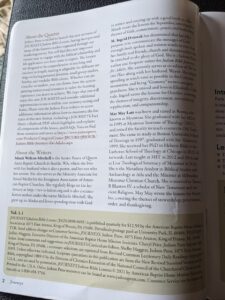Revised Common Lectionary:
Reign of Christ Sunday: 2 Samuel 23:1-7; Psalm 132: 1-12 (13-18); Daniel 7:9-10, 13-14; Psalm 93; Revelation 1:4b-8; John 18:33-37
Thanksgiving Sunday: Joel 2:21-27; Psalm 126; 1 Timothy 2:1-7; Matthew 6:25-33
Narrative Lectionary: Isaiah: A Child is Born, 9:1-7 (John 8:12)
We have come to the end of this season after Pentecost, and our first selection from the Hebrew scriptures is a psalm, titled David’s last words. Last week’s reading was the Song of Hannah, so the story of David, from the birth of the prophet Samuel to the last breath of King David, begin and end with songs of prophecy. David, anointed by God, spoke to the people that God made an everlasting covenant with him and called him to rule with justice over Israel. David hoped his kingdom mirrored the way God reigned over him. The king warned against those who did not follow God’s ways, and to be cautious in dealing with them.
Psalm 132 is a pilgrimage song for journeying to Jerusalem and worshiping at the temple. The psalmist recalls King David and his faithfulness to God by his desire to build a temple. Now, the people desire to worship as David hoped to, in the temple of God, with all the elements of temple worship. God has chosen to be among the people and has chosen to dwell in the temple in Jerusalem. This is where God will make the people thrive, and David’s reign everlasting.
The second selection of the Hebrew scriptures focuses again on Daniel, this time the vision of the heavenly courtroom in 7:9-10, 13-14. God is described as the Ancient One, dressed all in white and with white hair, sitting upon a throne of flames. The courtroom is in session, thousands are present, and the books are opened. In this vision, one like a human being is presented before the Ancient One and given all power and dominion and authority. This figure in Jewish tradition has often been understood as the people of Israel personified. Some traditions linked this with a Messiah figure, one who would come at the last days. Christians later interpreted this person to be the Christ.
Psalm 93 is a song of praise to God, the creator of the earth and the one who reigns on high. The psalmist describes God as robed like a king upon the throne. The waters on the earth lift up their voice in a roar, but God is the one who reigns over the earth, and God is more majestic than all of creation. God rules as the ultimate king, and God’s law is faithful and true.
The Epistle reading for Reign of Christ Sunday comes from Revelation 1:4b-8. This portion is part of the introduction by John of Patmos in his letter to the seven churches of the Roman province of Asia. This opening blessing acknowledges the one who reigns on the throne, and the one who is coming with the clouds, as mentioned by Jesus in the Gospels. God is the Beginning and the Ending, the Almighty who reigns on high, and who made the faithful into a kingdom of priests who serve God on earth.
The Gospel lesson from John is a troubling one. Jesus’ response to Pilate, who asked if he was the King of the Jews, is to ask Pilate who put him up to asking that question. Jesus told Pilate that his kingdom was not of this world, though he was born to reign. However, Jesus, in this account, also told Pilate that if his kingdom was of this world, his followers would not allow him to be handed over to the Jewish people. This passage is dangerous to read without questioning the motive of the author, as it places blame on the Jewish community and religious leaders, though it was Pilate who handed him over to be crucified. The emphasis needs to be on the reign of Christ not being of this world; however, we must also acknowledge the antisemitism in this text, regardless of whether the writer of John was Jewish or not.
For Thanksgiving in the U.S., the selection from the Hebrew scriptures comes from the prophet Joel. In his vision, probably after the exile and return from Babylon, God will restore the land. Everything will be green again, trees bearing fruit and vineyards full. God will provide abundant rain for the people, and the threshing floors and vats are overflowing with produce. God will restore what was taken from the people. The people will know that God is with them, and the people will never again be put to shame.
Psalm 126 is a song of restoration, another pilgrimage song, reminding the people of God’s faithfulness as they returned from exile. Other nations declared that God had done wonderful things for the people. Those who were mourning are now joyful. Those who went out with nothing but seeds have returned, carrying the full harvest.
The writer of First Timothy (purporting to be Paul) calls upon the reader (supposedly Timothy in Ephesus) to be in prayer and thanksgiving for everyone, including the rulers of the land in which the church resides. The author declares this is what God desires, so that the faithful of Christ may have the goodwill of the people around them. For there is only one God, and one Christ, who is the mediator between humanity and God.
The Gospel lesson for Thanksgiving Sunday is Jesus’ declaration to the disciples not to worry in Matthew 6:25-33. Jesus tells the disciples not to worry about their basic needs, for God has provided an abundance on earth. Instead, when we work for the reign of God and lift up one another’s needs, our own needs are met. Worrying doesn’t help us. Worrying raises our anxiety, causing us to spiral in our concerns, instead of remembering that when we are the body of Christ, we have one another. We can lift up one another and meet each other’s needs.
The Narrative Lectionary turns to Isaiah 9:1-7. The prophet is speaking a word of hope to the people of Judah, who witnessed the northern kingdom of Israel go into exile. This hope is a great light in a time of darkness. A new king has been born (most likely the king Hezekiah), whom Isaiah hoped would lead the people into God’s ways as a descendant of David and establish peace. Though the people have been without hope, experiencing the destruction of the northern kingdom and the attack of Assyria on Jerusalem, they have withstood the conquest and have survived, and the prophet has hope for the new king.
In John 8:12, Jesus speaks of himself as the light of the world. Whoever follows Jesus will never be in darkness but will have the light of life.
We have come to the end of the liturgical year, a day of gratitude, a day of recalling that Christ is the one who truly reigns. As we prepare to enter Advent, a season of watching and waiting for signs of Christ’s return in our world and our lives in a new way, we remember that Christ reigns eternally. The One Who Was, and Who Is, and Who Is To Come, the Almighty. God has given us this wonderful earth, full of the abundance of creation. There is enough for all, yet the powerful and wealthy have hoarded so much from others. Tens of thousands die in our world of starvation every day. Millions live in poverty. A handful—a few hundred out of seven billion people—are billionaires. When we put our trust in worldly princes, as the psalmist said long ago, they will fail us. Instead, we must look to the reign of God and work to serve one another. We must dismantle the systems and structures that build up wealth instead of meeting the needs of one another. This isn’t easy work. But on this Sunday, may we remember that our calling is not simply to live in God’s reign after we die—it is to remember that God’s reign is not of this world that we have made. The world we human beings have made needs to be dismantled and destroyed, so that what is eternal will live in us forever. Where the reign of God can flourish here and now.
Call to Worship
With grateful hearts, we gather to worship,
We give God thanks and praise.
With open minds, we listen to the needs of others,
We give God thanks and praise.
With outstretched hands, we serve one another,
We give God thanks and praise.
With all our being, we follow Jesus Christ,
And we give God thanks and praise.
Prayer of Brokenness/Confession
Alpha and Omega, Beginning and Ending, we confess that we are far too often focused solely on what is in front of us. We miss out on what You are doing in the world. We can only perceive our own struggles and difficulties, and ignore the cries of the oppressed, marginalized, and disenfranchised. Forgive us. Call us to lift our gaze. Guide us to open our minds and hearts to one another. Remind us that You are the Almighty, the Holy One, who made all of creation and made us, who knows our hearts and calls us by name. Remind us that there is much more than what we think we know. Keep us to Your ways, and lead us into the work of love, justice, restoration, and peace. Amen.
Blessing/Assurance (from Philippians 4:7)
May the peace of God, which surpasses all understanding, guard your hearts and minds in Christ Jesus. May you know Christ’s peace. May you know you are forgiven, loved, and restored. For God knows your name, and knows the hairs on your head. God loves you madly, and is so glad you have returned. Go forth, sharing the good news of forgiveness and love and join in the work of justice and restoration. Amen.
Prayer
God of Abundant Love and Grace, in this season we praise You for the fruits of the earth, for springtime and harvest. As the seasons turn, we know that You are with us through all of life’s challenges and changes. In times of scarcity, may we find a double-portion of Your grace made known to us. In times of hardship, may we find a double-portion of forgiveness and love. In times of struggle, may we find a double-portion of hope and justice. Abundant God, shower us with Your grace, peace, and joy. Amen.


